moses and the founders
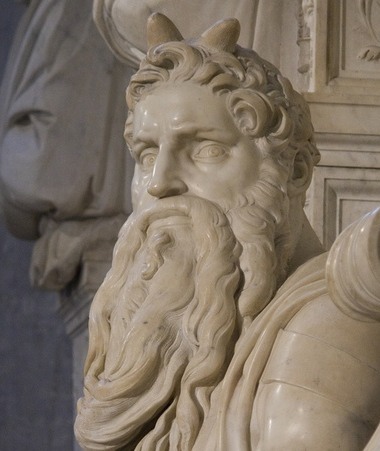
What influence did Moses have on America's Founders?
A heated discussion has been happening for some years now around what we should put in textbooks about American history, and in particular about the role of Moses.
I asked my social media friends to hit me with their best Moses shot. I'm flattered to have so many intelligent, well-read, interested friends, and was not at all surprised to see a snapshot of current thinking:
· "People usually point to Moses as the central figure in the development of our laws and legal system, but conveniently leave out all the others."Awesomest internet thread ever!! And — sheesh — all over the map! But not one mention of what I consider the single most important element in early American views of Moses. More on that in a moment. Meanwhile, these views aren't out of whack with what scholars, pundits, journalists, politicians, historians, and religious figures are saying.
· "Moses and the story of the Exodus had influence at several critical points in the development of the nation — on the pilgrims fleeing religious persecution, the patriots seeking political freedom, and the African Americans seeking freedom."
· "This doesn't truck with me given what I remember about Madison and Jefferson and freedom from religion, the Greek and Roman roots of democracy and republicanism, etc."
· "John Locke, and the Enlightenment, yes. Moses, and the biblical tradition, only very tangentially."
· "Moses was the beginning of the concept of individual responsibility as well as community standards...not that his example was perfect, but he was pivotal in my view."
· "The books of Moses outline a legalistic approach to organizing a society."
· "Ben Franklin compared the American Revolution to The Exodus from Egypt and wanted it on our currency."
· "My impression is that Moses had more influence on medieval forms of government, in that they assumed divine authority. Our constitution was more influenced by the Enlightenment, in that its checks and balances were designed to counteract human tendencies to use power unjustly."
· "I think that the inclusion of an individual in a state adopted textbook on history should, at the very least, be questioned, when the historicity of that individual is suspect at best."
· "For textbook standards, I'd be careful about how influences are talked about unless the writings of the Founders mention particular influences."
· "The Mosaic tradition was: a nation that needed to be formed, a Divine source of theological, social, and political guidance, and a leader (Moses) or set of leaders (founding fathers and Congress) that would be the [imperfect] instrument to execute the plan."
· "The torso of America rests on two legs: one is the classical Greco-Roman tradition and the other is the Judeo-Christian tradition. Without one or the other you just don't get to America. Without Moses you don't get to Christianity."
· "The Hebrews gave us the idea of a purposeful moral existence under God."
· "The Decalogue is fundamental to the Western understanding of law as an objective feature of the world, inscribed in clay and on the heart. Moses is a part of that tradition, regardless of whether you subscribe to the articles of the Christian faith."
· "Undergirding our law is the Judeo-Christian idea of God as the source of not only good but justice and ultimately law. So, while not a direct line, it's a more genealogical relationship."
Zack Kopplin in the Atlantic tests Betteridge's Law by asking in a headline "Was Moses a Founding Father?." Talking about how textbooks mislead students, his article mentions "crediting Moses with inspiring the American Constitution." And he quotes a professor as saying that these textbooks "would cause students to believe 'that Moses was the first American.' "
Kopplin also quotes someone in favor of including Moses:
She insisted, "Mosaic law influenced English Common Law, English Common Law influenced American law." (Mosaic law includes prohibitions on things like consuming grape skins and was intended for a theocracy with a monarch, none of which is part of our system of government.)Kopplin's parenthetical correction is mistaken: Mosaic law strongly warns against monarchy, though accepts it as a likely fate. His article concludes by saying that other states are considering this stuff, too. "That means Texas might no longer be the only state where kids learn that Moses was the first American."
This NPR story quotes a UT professor as saying, "I think for many of us who are academic historians, it's a very ahistorical connection to make. Moses is not someone who is quoted in the founding documents."
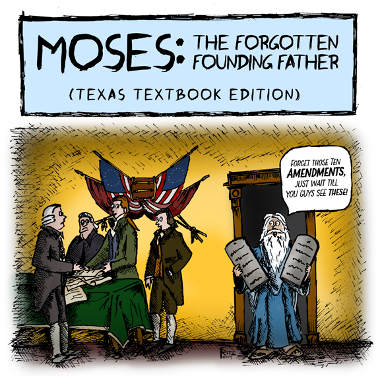
Scathing satire.
Articles in The Christian Century and We're History say things like "Moses was not the primary political influence on the founders," and "In no way does it make sense to say that the Constitution is grounded on Biblical precedents."
In a nice overview of the issue, Valerie Strauss compiles in the Washington Post a breakdown of some of the problems that critics have with these textbook standards.
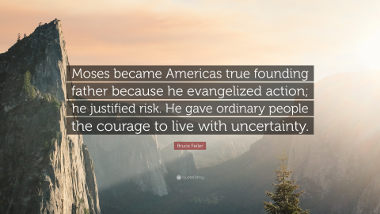
Then there's this guy.
Here's something more detailed: the Texas Freedom Network published a lengthy account of the problems with several textbooks Texas was considering. It appears to be one of Strauss's main sources. It was written by Emile Lester, a much-published professor at the University of Mary Washington.
The paper is worth reading in full. I'll excerpt from it liberally here, though. He begins by saying "A full understanding of the historical roots and principles of United States government is impossible without an understanding of religion's influence on our Founders." He goes on:
High school textbooks about U.S. government offer a wonderful opportunity for students and teachers alike to explore the religious roots of our government through an appropriate, accurate, and balanced discussion of important elements of the Jewish and Christian religious traditions. Unfortunately, five of the seven textbooks under review did not take advantage of this opportunity. These textbooks too often focused on controversial and vague claims backed by little or no discussion of evidence concerning the religious influences on the Founders.You might think, "Ah! Excellent! Finally someone will take these textbooks to task for ignoring colonial views of Moses's democratic design!" Nope. No mention of it. Continuing in his introduction, he writes:
The Pearson text claims, for instance, that the "roots of democratic government" can be found in "Judeo-Christian philosophy" but does not identify specific models or examples of democratic government in the Bible that influenced the Founders . . . . The McGraw-Hill textbook contends that the "biblical idea of a covenant . . . contributed to our constitutional structure" without acknowledging that the social contract idea the Founders derived from John Locke was in part a reaction against the biblical idea of a covenant. The Social Studies School Service textbook claims that "much of the Founders' commitment to liberty and individual rights" was influenced by "Christian teachings" without acknowledging the fundamental ways in which the Founders' conception of liberty differed from the Christian conception of liberty preached in the Bible and practiced by historical Christians such as the American Puritans.Going into more detail about the McGraw-Hill discussion of "covenant," he says that the American (Lockean) idea was more about people's natural rights than about accomplishing God's will. He devastatingly concludes, in italics, "The passage thus provides the student with more or less the opposite of the historical truth."
Several of these texts are also misleading because they fail to distinguish the relative influence that different ideas and historical figures had on the Founders. The Perfection textbook, for instance, has a box focusing on "a few of the people whose words influenced the content of" the Constitution that devotes a paragraph to Moses, John Locke, Charles de Montesquieu, and William Blackstone. The text is problematic not only because its claim that Moses influenced the Constitution is vague, but because it misleadingly suggests to students that these individuals exercised *equal* influence on the thought behind the Constitution. Montesquieu and Blackstone are mentioned several times in The Federalist Papers, for instance, but Moses is not mentioned once.
McGraw also says, "The Ten Commandments' emphasis on social justice and individual and communal responsibility has become a model for ethical laws. These ideals have been adopted in the United States and much of the world." Lester says that's less bad but still "problematic" because the text seems to use glowing terms of praise for only the Bible and is more just-the-facts about laws of Babylon, Rome, and England.
In the Perfection Learning text, a section called "Where did the Founders get their ideas?" names Moses, Locke, Montesquieu, and Blackstone. What "concept" did Moses give us? The concept that "A nation needs a written code of behavior." Lester, remarkably, doesn't offer a word of argument here, but instead focuses on the textbook's uncritical treatment of the Bible as a historical document on par with other, less contested documents. He has a point, but one wishes he'd bothered with the "concept" claim.
The Houghton textbook talks about the Founders' "Judeo-Christian influences," for both religions' claim of a divine source for law and rights, and the Protestant Reformation, for its ideas on the individual and self-government. Lester responds, rightly, that the text "gives no example of a law or set of laws in the Bible that influenced the Founders and no example of a Founder or a founding document that was influenced by the 'Judeo-Christian' concept of law. This makes it impossible to evaluate the legitimacy of the text's claim about law." And then he goes in for the kill: history *does* give an example of colonists looking to the Bible for a specific model for their government! And here's where! . . . just kidding. Nope. He doesn't say that.
He goes on to commend the Edmentum textbook because it "successfully avoids making vague, controversial, and unsubstantiated statements," and does make "specific and well-documented claims about the religious roots of our form of government": the Mayflower Compact. That's it.
Pearson Education says our democratic roots "include elements related to Judeo-Christian philosophy, dating back thousands of years to Old Testament texts and Biblical figures such as Moses and Solomon." Solomon?!
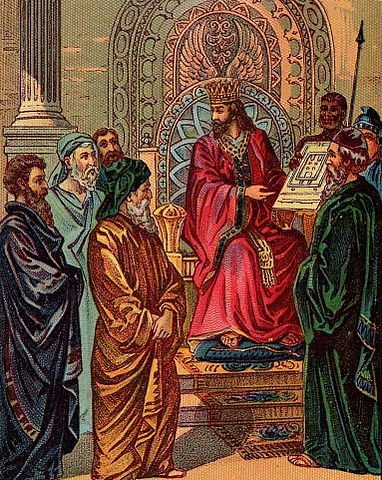
"I'm a man of the people. My tweets are the goodest."
Lester is similarly puzzled, but is at his most far-off here.
The forms of government mentioned in the Old Testament are theocracy and monarchy. Prominent figures in the Old Testament are occasionally critical of monarchy including the prophet Samuel and Gideon . . . . Still, those critical of monarchy or monarchs did not advocate democracy as an alternative, and the limited monarchy occasionally practiced in ancient Israel seems to bear little resemblance to American democracy. Even if it is accurate that government in the Old Testament had democratic features, the text never tells us how these democratic features directly influenced the Founders. It is similarly difficult to make sense of the text's claim that Moses or Solomon governed in a democratic way. Since the text here does not provide additional elaboration of its claims about Moses or Solomon or the roots of democracy in "Judeo-Christian philosophy," it is impossible to assess these claims.Lester neglects to mention one figure who was also occasionally critical of monarchy: a fellow whose name begins with M, and whose only mention of monarchy is a diatribe about the horrible time Israel will have if it ever clamors for a king.
Lester's claim that those critical of monarchy "did not advocate democracy as an alternative" raises a red flag. Although the Book of Judges (likely written by a royal scribe with a royal viewpoint) is scornful of Israel's 3-to-4–century representative citizen government, lamenting that "In those days there was no king in Israel, but every man did that which was right in his own eyes," he doesn't put together that Samuel, Gideon, and Moses were all judges of Israel who spoke their anti-monarchy diatribes to people who had elected their own leaders for centuries. (Arguably. Bear with me.) It's a huge miss.
I'm especially intrigued by his "Even if it is accurate that government in the Old Testament had democratic features . . . ." Aha, let's hear it, Lester! Come on! Maybe he *does* really know something. If so, he isn't saying so here. He's content to call the governments of the Old Testament either monarchy (Saul, David, Solomon, and the others) or theocracy, which must mean the judges from Moses to Samuel.
Now, it's for sure that all this is contested. We don't know much that's confirmed in a historical way about the messy federation of tribes known as Israel, or about exactly what role a shofat ("judge") played. They didn't have our three branches of government. These "judges" seemed to hear cases and disputes like our judges, but also served as military and political leaders and also had figurehead roles like our president, and legislated like our congress. Whether this really was anything we'd call "democracy" is kind of a crapshoot.
But that's not the question. The question is what Americans in the colonies in the 17th and 18th centuries thought. What did they *think* Moses did, and how did it affect them? Where, as Texas asks, did they get their ideas? Lester is right. These texts never tell us.
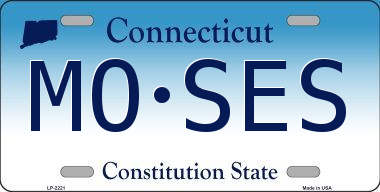
One place they got their ideas was the bunch of governments they grew up in. The colonies had charters and constitutions, which were the legal air that most Founders breathed. One of the earliest was Connecticut. Even now, Connecticuters will proudly tell you their state was the first place ever to have a written democratic constitution establishing a representative government. Their license plates say "Constitution State." That claim is disputed, and the whole thing winds up retreating into bickering. But, again, the question here isn't who was factually first. The question is about what was happening on this soil.
And what was happening was that the good people of Connecticut looked to the Bible, among other places, not for some vague idea of heritage, or the summum bonum, but for a concrete example of governance.
In chapter 18 of Exodus, Moses's father-in-law Jethro (played by Danny Glover) comes to visit and sees Moses doing his daily thing for the first time:
13 And it came to pass on the morrow, that Moses sat to judge the people: and the people stood by Moses from the morning unto the evening.But not quite *all* that Jethro had said. Jethro had advised Moses to choose leaders from the tribes, and indeed the Genesis account says he did. Later, though, in the first chapter of Deuteronomy, it becomes clear how exactly these leaders were chosen. Moses is recounting this story to the Israelites:
14 And when Moses' father in law saw all that he did to the people, he said, What is this thing that thou doest to the people? why sittest thou thyself alone, and all the people stand by thee from morning unto even?
15 And Moses said unto his father in law, Because the people come unto me to enquire of God:
16 When they have a matter, they come unto me; and I judge between one and another, and I do make them know the statutes of God, and his laws.
17 And Moses' father in law said unto him, The thing that thou doest is not good.
18 Thou wilt surely wear away, both thou, and this people that is with thee: for this thing is too heavy for thee; thou art not able to perform it thyself alone.
19 Hearken now unto my voice, I will give thee counsel, and God shall be with thee: Be thou for the people to God-ward, that thou mayest bring the causes unto God:
20 And thou shalt teach them ordinances and laws, and shalt shew them the way wherein they must walk, and the work that they must do.
21 Moreover thou shalt provide out of all the people able men, such as fear God, men of truth, hating covetousness; and place such over them, to be rulers of thousands, and rulers of hundreds, rulers of fifties, and rulers of tens:
22 And let them judge the people at all seasons: and it shall be, that every great matter they shall bring unto thee, but every small matter they shall judge: so shall it be easier for thyself, and they shall bear the burden with thee.
23 If thou shalt do this thing, and God command thee so, then thou shalt be able to endure, and all this people shall also go to their place in peace.
24 So Moses hearkened to the voice of his father in law, and did all that he had said.
13 Take you wise men, and understanding, and known among your tribes, and I will make them rulers over you.Bam! This, ladies and gentlemen, is a pattern for representative government. Moses tells his people to choose leaders from among themselves, to represent them and address their needs at local, tribal, and national levels.
14 And ye answered me, and said, The thing which thou hast spoken is good for us to do.
15 So I took the chief of your tribes, wise men, and known, and made them heads over you, captains over thousands, and captains over hundreds, and captains over fifties, and captains over tens, and officers among your tribes.
16 And I charged your judges at that time, saying, Hear the causes between your brethren, and judge righteously between every man and his brother, and the stranger that is with him.
17 Ye shall not respect persons in judgment; but ye shall hear the small as well as the great; ye shall not be afraid of the face of man; for the judgment is God's: and the cause that is too hard for you, bring it unto me, and I will hear it.
I'll say that again: in the book of Deuteronomy, Moses told his people to choose their own leaders from among themselves, to represent them and address their needs at local, tribal, and national levels.
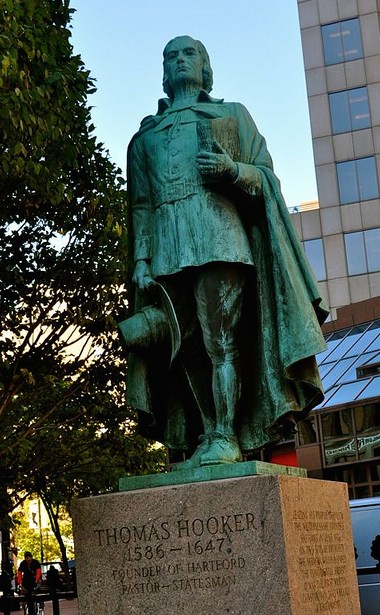
Back in 1638, just as Connecticut was preparing its Fundamental Orders (its constitution), one of the key figures in their politics at the time, the Rev Thomas Hooker, gave a sermon on the text of Deuteronomy 1:13. The sermon notes survive. Read them and be galvanized:
Doctrine:The Fundamental Orders of Connecticut are a cornerstone of American democracy and thought. Virtually all the colonial charters that came after were aware of that document, and reflected it in some measure. It's a stretch to say that it was "based on" or "inspired by" this one sermon by Hooker, but he was active in politics and a founder of the colony, and it's no stretch at all to say this reading of the Pentateuch was instrumental for them.
I. That the choice of public magistrates belongs unto the people by God's own allowance.
II. The privilege of election which belongs unto the people therefore, must not be exercised according to their humors, but according to the blessed will and law of God.
III. They who have power to appoint officers and magistrates, it is their power, also, to set the bounds of the power and place unto which they call them.
Reasons:
I. Because the foundation of authority is laid, firstly, in the free consent of the people.
II. Because, by a free choice the hearts of the people will be more inclined to the love of the persons [chosen], and more ready to yield [obedience].
III. Because of that duty and engagement of the people.
It was certainly shared. The Reverend John Cotton, another towering colonial figure, wrote a thing called "Moses His Judicials," that interprets the passages in Exodus and Deuteronomy the same way, as an example of people choosing their leaders from among themselves.
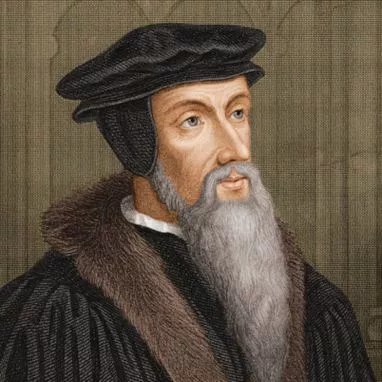
And let's not forget John Calvin. He was a huge influence on life and thought in the colonies. (The Calvinist-published Geneva Bible was their bible, far more than the King James. Its anti-monarchical notes helped fertilize our soil.) Here's Calvin on Moses:
Hence it more plainly appears that those who were to preside in judgment were not appointed only by the will of Moses, but elected by the votes of the people. And this is the most desirable kind of liberty, that we should not be compelled to obey every person who may be tyrannically put over our heads; but which allows of election, so that no one should rule except he be approved of by us. And this is further confirmed in the next verse, wherein Moses recounts that he awaited the consent of the people, and that nothing was attempted which did not please them all.That's in the 1550s. And our incredibly Biblically-literate forebears knew Calvin nearly as well as they knew the Scripture.
Flashing forward to the 1760s, Benjamin Franklin talks about the people of Connecticut deciding to "be governed by the Law of Moses, as contained in the Old Testament." A modern reader might just think "Moses: aha, the Ten Commandments!" and be done with it. But Franklin isn't talking about outlawing graven images or dishonoring your parents. He's talking about self-governance. His comment comes in a set of notes in which he argues against a royalist pamphlet. (It's highly entertaining, calling to mind a vicious but erudite Facebook argument.)
We got the word "democracy" from Greek. We got the word "Senate" from the Roman Republic. And we got plenty of ideas from ancient Greek and Roman government. And let us please insist that textbooks educate our kids on Native American government, specifically the Iroquois Confederacy, whom Franklin and others observed with fascination and drew liberally from. But let's not write off old Moses.
No, he's not mentioned by name in the Federalist Papers. No, he's not a Founding Father, or "the first American." No, our laws don't very much resemble the Ten Commandments.
But the Founders bore the political DNA of those who saw in his words a tested pattern for self-government. That's plenty. You don't have to believe in God, or even that Moses existed. But you do have to know that these people opened this book, and understood it this way. Historians, journalists, legislators, pastors, and teachers who vaguely pedestal Moses or sweep him away are simply not digging deeply enough.
The Bible and the Founders are both more brandished than sought. We talk about what we want our kids to know: what do *we* know? Both the pro-Moses and anti-Moses teams seem to be unaware of an important fact of how earlier Americans saw him.
We can do better at remembrancing an exhilarating chapter in human history.
A final detail: rank-and-file believers of the time thought of Moses as the deliverer of *God's* law, not a human scheme. They believed he bore the commandments from the mountain; they didn't think he came up with them. But, though Moses claims God spoke to him, he never claims this particular idea — "Take you wise men" — came from God. He's careful in what he attributes to divine inspiration and what comes from himself. This one comes from him. (And Jethro, exquisitely voiced by Danny Glover.)
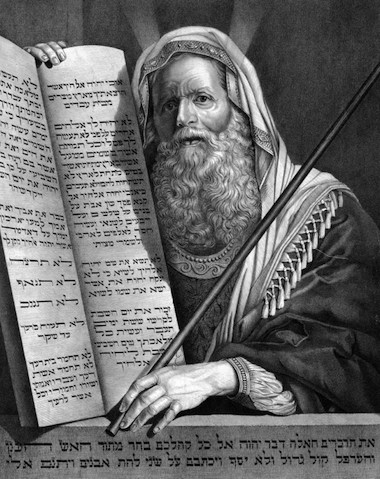
The Ten Commandments aren't the basis of our law except in the vaguest way. Moses didn't invent the rule of law. God's covenants in the books of Moses aren't any kind of pattern for our government.
But our Founders and their forebears did credit him with something substantial and specific: a clear pattern for choosing leaders in a representative democracy. For that, he deserves mention, in our books and conversations. Not voodooistic handwaving or cursory acknowledgment, but actual credit for a good idea.
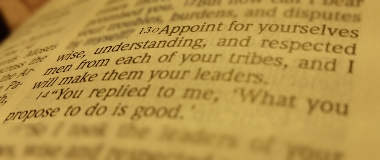


Comments
Instead of making monuments containing the Ten Commandments, it might be better to inscribe them with Hooker's statement:
The foundation of authority is laid in the free consent of the people.